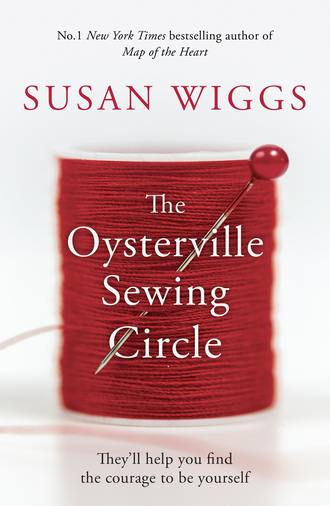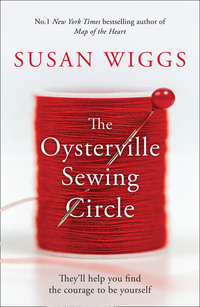
Полная версия
The Oysterville Sewing Circle
And as incredible as she looked, she had managed to pursue the one career where her looks were not particularly striking—merely commonplace in that world.
Lately—and he knew this frustrated her—the bookings for her high-fashion modeling had tapered off. He was not going to be the one to ask the reason for this. He didn’t want to hear her say it was because she was old. He didn’t want to hear her say it was because she lived in the world’s smallest backwater, where she had to drive for two hours or more to find even a glimmer of civilization.
“Do you have time for a cup of coffee?”
She glanced at the clock over his office door. “Just a bit. Hair and makeup starts at eleven.
“Whose pretty clothes will you be wearing today?”
She hesitated. He could tell she wasn’t happy. “McCall’s,” she said briefly.
A discount store on the lower end of the spectrum, then. Not exactly Nordstrom. “They’re lucky to get you.”
She took the proffered cup of coffee and sprinkled it with a dusting of stevia, ever mindful of avoiding extra calories. “Right.”
He added a generous dollop of cream and real sugar to his cup. After the morning run, he was starving, and he didn’t have a break until third period. While loading up his messenger bag for the day, he debated with himself about whether to bring up this morning’s encounter with Caroline.
If he didn’t, Sierra would hear about the drama of the “lost, not lost” kid from someone else. She’d hear one of his athletes had found the little girl. She might wonder why he hadn’t said anything about the encounter. If he did—
“I ran into Caroline Shelby,” he said, threading a belt around his pants. “This morning.”
She perched one hip on the edge of his desk. Her eyes widened and her lips parted in surprise. “Caroline! You’re kidding. She’s been a ghost for the past ten years. Where did you see her? Here in town?”
He nodded. “During a training run with the team, super early. She was at the Bait & Switch. Seems like she’d just rolled into town, like maybe she’d been driving all night. That’s how it appeared, anyway. Did you know she was coming?”
“No. Why would I? We haven’t been in touch in years, other than the occasional wave on Facebook. What’s she doing here?”
“I didn’t ask. Like I said, it was early, and I was out with the cross-country team.” He paused. “She has two kids. Did you know that?”
Her green eyes opened even wider. “Caroline has kids?”
“Little boy and little girl.”
“Wow, I had no idea. I guess I’ll run into her at some point, then. Is she staying at her folks’ place?”
“Didn’t ask that, either.”
“Caroline Shelby. Two kids. Wow,” she said again, slowly shaking her head.
Will had thought he and Sierra would have a kid or two by now. That had always been the plan, anyway. So far no luck. Not for lack of trying, which was admittedly his favorite part of the process. He was ready for kids. He pictured them growing up here, the place where his heart had always belonged. He had been all over the world while serving in the navy. He’d been deployed with his SEAL team to places most people had never heard of. His team had been based in Coronado, and he’d seen places of magic and stunning beauty, but when he thought about where he belonged, his mind always wandered back to Oysterville, where the summers burst over the land like golden blessings, and the winters roared through with torrential abandon.
Sierra had agreed to the plan. Like Caroline, she had grown up here. Her father was still the senior pastor at Seaside Church, and her mother managed the church’s newsletter and social calendar.
Sierra glanced at the clock over the office door. “I need to hit the road.” Stepping up on tiptoe, she gave him a peck on the cheek. “Don’t hold dinner for me. I’ll probably be late. I might stay over in the city.”
That was a compromise they’d made early on. If they were going to live out on the coast, she wouldn’t always make it home after a job. “Okay, let me know. Go be gorgeous.”
“Right.” Small eye roll.
“Be safe on the road. Love you.”
And then she was gone. Love you. Of course he loved her. She was his wife. These days, their love yous were rote and reflexive, a sign they were in a settled phase of their marriage. Which wasn’t a bad thing. Yet sometimes he felt bad about it. He hoped it was his imagination, but more and more lately, his wife was showing signs of discontent. She talked constantly of the city life she’d lived while he was on deployment—L.A., Portland, Seattle. Now there were unsettling signals that their marriage was fraying at the edges. What would make her happy? He made a note to work on the cedar-lined walk-in closet he was building for her at the house. Maybe he’d finish it tonight as a surprise for when she got home.
He organized his things for the day and made his way from the athletic complex, past the administration center to the high school. Colleagues and students greeted him along the way. Although Sierra called it a fishbowl, Will liked the close-knit feel of the community, the sense of permanence of life here. Growing up a navy brat, he’d never lived in one place long enough to truly fit in, and the only place that had ever felt like home was Water’s Edge.
When he and Sierra had settled here permanently following his discharge, they were treated like small-town royalty—the preacher’s daughter and the wounded hero, a designation he was happy to shed as time went on. Now he was just Coach Jensen, settling into a job and a life that felt like the right fit for him—most of the time.
Because of his coaching duties, he didn’t have a homeroom to supervise, so he hit the staff room to check his mailbox, then the math office to log in, view his calendar, and grab some supplies. The school hallway was festooned with notices—an upcoming Tolo dance, college night, club meetings—and after announcements and the Pledge of Allegiance, it was crowded with kids slamming their lockers, talking too loud, hauling their overstuffed backpacks to class.
Will strode into his classroom just as the first period bell rang. He blinked the lights once to signal his arrival, then stood at the front of the class. “All right, you scholars and ne’er-do-wells,” he said, his customary greeting. “Let’s kick those brains into gear.”
There were the usual shuffles and a few groans and yawns. Homework out. Phone check—he took attendance by the phone parking lot, a charging station at the front table. A missing phone meant a missing student—or a forgetful one. Seat 2C was not present. “Ms. Lowry,” he said. “You’re either absent or you’re Snapchatting after first bell …”
With an elaborate sigh, May Lowry surrendered her phone to the charging station. “All present and accounted for,” he said, then turned to the whiteboard to pose the first problem of the day. “So let’s say you’re starting a car trip at nine in the morning from a point—”
“What point?” called someone in the back.
“From wherever, moron,” said the kid next to him. “It doesn’t matter.”
“I say it matters.”
“Fine,” Will interjected. “New York City. Your car trip is starting in New York City.”
“And where am I going?” asked May.
“Oysterville,” said another kid, “where else? Aren’t we the center of the universe?”
“Listen up,” Will said. “The plot thickens. You’re traveling at forty miles per hour. At ten a.m., another car started traveling from the same point at sixty miles per hour in the same direction. At what time will that car catch up and pass you?” He sketched out the problem on the board.
Jana Lassiter raised her hand. She was a cheeky girl, smart and fun to have in class. “I have a question. If I’m in New York City, why would I ever leave and come back here?”
“Yeah, good question,” someone else said.
“We’re America’s Tidewater Vacationland,” Will said, “according to the highway billboard. But that’s not the point—”
“Have you been to New York City?” Jana asked.
Will was sorry he’d brought it up.
“Mr. Jensen’s been all over the world,” said another girl, Helen Stokes. Embarrassingly, she was one of several girls who had a crush on him, which he pretended not to notice. “In the navy, right, Mr. Jensen?”
“Again, not the point. This is a rate, time, and distance problem.”
“How is this going to help us in the real world?” asked someone.
“You’re not even going to get to the real world if you don’t pass this class,” Will pointed out.
“Did you have to know this stuff to be a Navy SEAL?”
“Math was just the tip of the iceberg,” Will said.
“Is it true you got injured saving a life? Is it true you have a glass eye?”
“A prosthetic eye. I’ll tell you what’s true,” Will said, easily skirting the topic. “Detention, that’s what. And you’re about three seconds from a maximum sentence.”
Chastened, the boy slumped in his chair. “Sorry, sir.”
“So instead of trying to distract everyone, let’s work the problem, people. Let’s let D1 equal the distance of the first car, and t equals time …”
Distance, rate, and time, reduced to a neat equation. It wasn’t messy. It had one and only one solution, not a hundred possible paths and permutations. If Caroline Shelby left town at warp speed and traveled a distance of a whole continent and ten years, at what point would he quit wondering what might have been?

As Caroline drove the final leg of her journey, the morning marine layer hung like weightless gauze in the salmonberry and bracken that bordered the road. The strange mist made her feel displaced in time and space, as if she were floating through some primordial world.
She was on edge from the adrenaline rush of misplacing Addie at the Bait & Switch. She felt jittery and wide awake, engulfed by a sense of unreality. Yet what had set her on this path was all too real. She had come here because she needed breathing space, a way to sort herself out, a plan for the children. She had no idea if she’d find the answers here, but she was out of options.
“It’s kinda spooky out there,” Flick said from the back seat.
“You think?” In the early light, the estuaries and forested uplands probably did look vaguely threatening.
“Are we safe?”
He asked her that a lot. No six-year-old should have to ask that question. Finally she felt confident of the answer. “Absolutely.”
“I don’t see any houses. Just woods and fog.”
“And hundreds of thousands of shorebirds,” she pointed out. “It’s the spring migration, and all kinds of birds come here to rest and feed. I’ll take you exploring, and you’ll see. We’ll get you some binoculars like a professional bird watcher.”
Addie awakened with a whimper. “Is it morning?”
“You got lost,” Flick said. “You were naughty.”
“I’m not naughty.”
“She’s not naughty.” Caroline intervened before the bickering had a chance to take hold. “Addie, even though you didn’t mean to do anything wrong, you forgot to stay put when I went after Flick back at the gas station.” She glanced in the rearview mirror. The little girl yawned and rubbed her eyes. “It’s scary to me when I don’t know where you are every moment. So when you climbed back into the car without telling me, I got really worried.”
Addie stared out the window, blinking the sleep from her eyes.
“Mama left without telling us,” Flick pointed out.
Caroline tried not to flinch at the memory. “That’s completely different. She didn’t leave you by choice. She wouldn’t have done that for the world.”
Since the incident—she didn’t know what else to call it—she had been speed-reading books on helping young children through crisis. During the weeklong drive, she’d had daily videoconferences with a child psychologist she couldn’t afford. The counselor and the books offered suggestions—how to speak in terms the children would understand, how to respond honestly and reassuringly. Yet ultimately, there was no script for this, no road map to point her in the right direction. Despite her efforts so far, she knew that in the end, words would never be enough.
Don’t lie. But don’t overexplain.
“You said we were almost there.” Flick switched topics, craning his neck as they passed a billboard welcoming them to your tidewater vacationland.
“Are we almost there?” Addie asked.
“Well, that depends on what you mean by almost. I can tell you, we’ll be there in time for breakfast. I sent my sister Virginia a text message, and she said she’s making blueberry pancakes with real syrup. Her blueberry pancakes are the best in all the land.”
A glance at the rearview mirror told her she had their attention. Good, she thought. Engage them in the “right here, right now” moment. Another thing she’d figured out in her crash course in parenting was to offer the children concrete information on a level they could understand. Tell them things in advance. Not too far in advance, but let them know what to expect and anticipate. They had only ever known the busy, eclectic neighborhood of Hell’s Kitchen, where they’d lived with their mother, just a block from their primary school on West Forty-Fourth Street. Now they were about to enter a strange new world, and Caroline could tell from their quiet, wide-eyed expressions that they were worried.
“Let’s play the remembering game,” she said, hoping to stave off the restlessness that often preceded meltdowns. “What’s the name of the town where my family lives?”
“Oysterville,” they piped up together.
“Hey, that’s great. You got that down. Here’s a tricky question. How many brothers and sisters do I have?”
“Five!” Flick said.
“Five kids in my family, so I have four siblings.”
“How many is four?” asked Addie.
“Like your fingers,” Flick said, holding up his hand. “One, two, three, four.”
“You’re right about the fingers,” Caroline said. “I have two older sisters and two younger brothers. Remember, I told you our family was a sibling sandwich with me in the middle.”
Crushed in the middle, she thought.
“Let’s play the name game one more time,” she said. She wanted to familiarize them with their new circumstances so things wouldn’t feel so completely foreign to them. “Can you remember my sisters’ names?”
“Virginia,” said Flick. “You just said.”
“Good. How about my other sister? Remember how I said we’re all named after states. Caroline for Carolina, Virginia, and …?”
“Georgia!” Flick said.
“Georgia,” Addie repeated.
“That’s right. And my two brothers are both younger than me, because I’m in the middle. Our parents named the boys after cities.” In the too-much-information department, her parents liked to tell people they named each child after the place where he or she had been conceived. “See if you can remember,” she said. “I showed you their pictures on my phone.”
“Jackson.”
“That’s right. Jackson lives on a boat in the harbor at Ilwaco. It was dark when we passed it, but I bet he’d like to show you around. He’s the seafood buyer for the restaurant, and he’s a fisherman, too.”
“How can he live on a boat?” asked Addie.
“Believe me, you’re not the first girl to ask that.” Jackson was the free spirit of the family, never overly concerned with domestic matters.
“Is it a house, only it’s on a boat?”
“Not exactly. It’s more like a boat with really small rooms. You’ll see one day soon. Now, what about my other brother—the youngest one in the family?”
Hesitation.
“Starts with Au,” she hinted. “When you’re older, you’ll study states and capitals in school, and you’ll learn that this is the capital of Texas.”
Flick shrugged. “I forgot.”
“That’s all right. It’s hard to remember names before you get to know who they belong to. My brothers are Jackson and Austin. My parents’ names are Dottie and Lyle. How about this one—can you remember the name of my family’s restaurant?”
“Star of the Sea!”
During the drive, they’d stopped at dozens of restaurants, diners, and truck stops. She had told them about the Shelby family restaurant, founded by her parents. A now-famous destination on the peninsula, it was located on the beach at the edge of the dunes, where the sea and sand met in irregular stitches.
“That’s right,” she said. “Star of the Sea. I think you’re going to like it.”
“Can we go there now?” asked Flick. “I’m hungry.”
“My sister is fixing breakfast at the house,” Caroline reminded him. “You’ll have plenty of chances to eat there. The whole Shelby clan works at the restaurant in some way or other.” Her brother Austin was the finance guy, a CPA who kept the family books, and Georgia was the restaurant’s general manager. “It’s a true family business.”
“Except you,” said Flick.
“Except me,” she admitted.
When she was little, Caroline hadn’t realized how hard her parents had worked—the long hours, the tangled problems of launching and sustaining a restaurant. As she got older, she had tried to do her share, but she had never possessed the passion and focus it took to throw herself into the enterprise. In the Shelby family, she was the dreamer, always yearning for something that drew her far away.
“I did design the chefs’ coats and servers’ outfits a long time ago.
They didn’t like them, though.
Too avant-garde.”
“What’s that mean?”
“Too awesome,” she said.
“Are you going to work at the restaurant now?” Addie asked.
I don’t know what the hell I’m going to do, Caroline thought.
“We’ll see.” She paused. “When I was a kid, I was always skeptical every time I heard a grown-up say, ‘We’ll see.’ What does that even mean? See what? When? How will we see what I’m talking about if I don’t even know what I’m talking about?”
No response. She didn’t blame them for being as confused and out of their depth as she was. She sighed again. “Now I just said, ‘We’ll see.’ Does that make me a grown-up?”
“You’ve always been a grown-up,” Flick pointed out.
“Thanks a lot. You don’t think I was ever a kid like you?”
“We’ll see,” he said.
“You’re cheeky,” she told him. “Now, pay attention. I want you to watch out the window for the mailbox. It says Shelby and it’s decorated with seashells.”
She slowed down as they passed undulating dunes on the west side and coastal forest on the east, with the fog snaking through like a serpent made of mist. Hand-lettered signs for fresh eggs and organic produce, U-pick cranberries and blueberries beckoned travelers. Battered mailboxes bore names both familiar and new to her—Gonzalez, Moore, Espy, Haruki, Ryerson.
“I see it,” Flick exclaimed. “Is that where we’re going?”
The seashell mailbox was a monstrosity, so ugly it had become a local landmark. She and her brothers and sisters had made it one year as a surprise for their parents. The five of them had mortared the base and mailbox with a mosaic of shells, sea glass, driftwood, and bones from a sea lion carcass on the beach. She, of course, had wanted to direct the design process, but the others had thrown themselves into it with no regard for aesthetics. When their mother saw it, she’d burst into tears, and to this day, Caroline wasn’t fully convinced they were sentimental tears. Now, decades later, the mailbox was a silent sentinel to the past, evoking memories she was suddenly quite grateful for.
She turned into the lane that led to the Shelby family home. The driveway was paved with crushed oyster shells and edged by wind-sculpted shrubbery and a row of beach roses. Since she had left home right out of high school, she had dutifully visited a few times at Christmas, flying into Seattle or Portland, renting a car, and making the three-hour trek to the coast. That seemed to satisfy the family and also preserved her status as the official black sheep.
Every family needed a pet, her brother Jackson used to joke.
Today’s arrival was different. This wasn’t a visit. And now the black sheep had two lambs.
Nothing here, in the watery kingdom where she’d grown up, had changed. That was her first impression. The trees and structures were wind-sculpted and weather-beaten, anchored to the landscape by their spreading roots that clawed into the dunes. The home where she’d grown up was a big, unassuming saltbox, its clapboard siding painted iron gray, its trim white, its roof perpetually furred by moss and lichen.
The ordinary dwelling was made spectacular by the setting. Beyond the garden lay the dunes. The prelude to a kingdom. The shifting sands and blowing grasses stretched toward the sea, wild as a restless dream. There was no boardwalk here as there was in the main town of the peninsula, no network of pathways, just a tangle of waist-high beach grass entwined with sturdy small flowering plants—coastal strawberry and sea rocket, native lupine and beach pea. The occasional wind-harried cypress or cedar tree reared up, bowing eastward as if in perpetual flight away from the ocean.
“We made it,” she said to the kids. “This used to be my whole world, once upon a time.” She scanned the yard, with its gnarled apple trees and the big liquidambar with a wooden plank swing hanging from a high branch. There was a chicken coop and a garden surrounded by a deer fence. It really was a beautiful place—one she couldn’t wait to leave.
“We’re here?” Flick asked.
“We’re here!” Addie said. She clutched Wonder Woman to her chest.
“Finally,” Caroline assured them.
By the time she parked and unbuckled the kids, her parents had come out to the front porch to greet them.
“Welcome home,” said her mother, rushing down the steps and crossing the yard, her arms open wide. Her long hair flew out behind her, and for a moment she looked ridiculously young in fitted jeans and a plaid cotton shirt, and the customary Blundstones she favored for gardening.
As she drew closer, Caroline could see the wispy lines fanning her mother’s eyes, the slight thickening of her figure. But the smile and the outstretched arms were the same as always.
With the kids clinging like remoras to her legs, Caroline felt herself enclosed in Dottie Shelby’s firm hug. Her mother smelled of hand soap and Jergens lotion, and her embrace was a sanctuary. “I’m so glad you got here a whole day early,” she said, stepping back.
“I couldn’t sleep, so we loaded up and started driving,” Caroline said. “Hey, Dad.”
He enveloped her in his assured, powerful embrace. It was the first time Caroline had felt truly safe since Angelique’s death. Closing her eyes, she allowed herself to savor a moment of bliss, receding briefly into the role of cherished daughter.
Her parents were sturdy and good-looking, often cited in the local chamber of commerce brochures as the epitome of a couple who had built their dream out of hard work and dedication. They had met at culinary school in the Bay Area—Dottie, a peninsula girl, and Lyle, a California native. By the time the program ended, they had woven their dreams—and their lives—together.
“Well,” Caroline said, “it’s good to be back. Flick and Addie have come a long way to meet you.”
Her mother went down on one knee and regarded the children at their level. “I’m glad you’re here. My name’s Dottie, and that’s Lyle. You can call me Dottie, or Grammy Dot. That’s what my other grandchildren call me.”
By other grandchildren, was she implying something?
“You don’t have to decide right now,” she added.
Addie clutched Wonder Woman and stared at the ground. Flick regarded Dottie with sober contemplation. “My real name’s Francis,” he said.
“Oh! Do you prefer that to Flick?”
He shook his head. “When I was a baby, I couldn’t say Francis, so I called myself Flick and it stuck. So I’m keeping it.”









